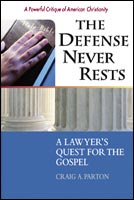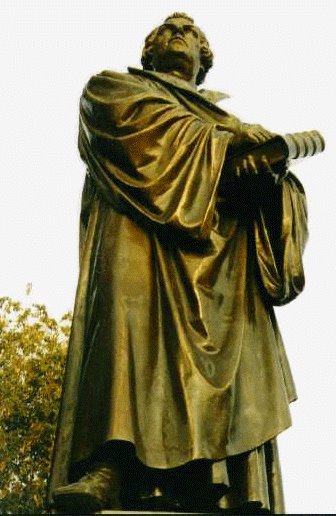08 February 2006
The Defense Never Rests
Originally posted on Necessary Roughness on November 14, 2005.
 On the plane to Houston, I finished The Defense Never Rests: A Lawyer's Quest for the Gospel by Craig A. Parton. Parton is a lawyer who left American Evangelicalism for Lutheranism in 1995.
On the plane to Houston, I finished The Defense Never Rests: A Lawyer's Quest for the Gospel by Craig A. Parton. Parton is a lawyer who left American Evangelicalism for Lutheranism in 1995.
The text begins with his college days, studying for law school and active in Campus Crusade for Christ. One class he took covered the writings of Christian theologians: Calvin, Luther, St. Augustine, etc. The differing points of view between Calvinism, Roman Catholicism, Lutheranism, and even American Evangelicalism caused him to reevaluate the validity of the Scriptures. All claiming to have derived their teachings from Scripture, so the author studies the Scriptures for himself, checking for validity in addition to seeing who was the closest.
Parton's study of the original Greek text surrounding Christ and the Resurrection lead him to believe the Scriptures. He assesses the testimony from scriptural and other sources, using his skills as a lawyer to determine reasonable doubt and other tools. Here the author makes a point: why would so many disciples allow themselves to be martyred if they knew the Resurrection was a lie?
Parton details the difficulty of reconciling the doctrine of American Evangelicalism with scripture, and his family attends their first Lutheran service on Good Friday, 1995, the service of Tenebrae. Here the full force of the law was preached, with the consequences of our depravity. On Easter they heard the Gospel, with all the joy and consequences of the Resurrection. Satisfied, they joined the church.
The author notes with a sense of irony that the church they joined was showing signs of evolution towards Evangelicalism: the "contemporary" service and the discarding of liturgy, the stopping of the use of the Small Catechism to teach children, the lack of Confession and Absolution, the disuse of the hymnal, and the lack of Christ-centered worship. He warns against this movement by "church growth" advocates who seek to pack churches by taking doctrine out of them. We should be able to defend our traditions and the validity of scripture, he writes.
The book has a nice appendix by John T. Pless, author of Handling the Word of Truth. Pless covers the scriptural origins of the ancient liturgy and how they point to Christ.
The Defense Never Rests is an easy read with something for everybody: a defense of the Gospel for those who don't believe, a witness of transition for those who don't like what they are hearing from the pulpit, and signs of heterodoxy and an admonition to defend what is right for those who have been the faith. I recommend it to anybody, Lutheran or not, and especially Appendix A to the writer of the Lutheran Jargon blog. :)
Recommended for those who wish to contend for the faith, whether in front of nonbelievers or in front of Christians wishing to deviate from ancient doctrine and practice.
Feedback
Originally posted on Necessary Roughness on November 14, 2005.
 On the plane to Houston, I finished The Defense Never Rests: A Lawyer's Quest for the Gospel by Craig A. Parton. Parton is a lawyer who left American Evangelicalism for Lutheranism in 1995.
On the plane to Houston, I finished The Defense Never Rests: A Lawyer's Quest for the Gospel by Craig A. Parton. Parton is a lawyer who left American Evangelicalism for Lutheranism in 1995.The text begins with his college days, studying for law school and active in Campus Crusade for Christ. One class he took covered the writings of Christian theologians: Calvin, Luther, St. Augustine, etc. The differing points of view between Calvinism, Roman Catholicism, Lutheranism, and even American Evangelicalism caused him to reevaluate the validity of the Scriptures. All claiming to have derived their teachings from Scripture, so the author studies the Scriptures for himself, checking for validity in addition to seeing who was the closest.
Parton's study of the original Greek text surrounding Christ and the Resurrection lead him to believe the Scriptures. He assesses the testimony from scriptural and other sources, using his skills as a lawyer to determine reasonable doubt and other tools. Here the author makes a point: why would so many disciples allow themselves to be martyred if they knew the Resurrection was a lie?
Parton details the difficulty of reconciling the doctrine of American Evangelicalism with scripture, and his family attends their first Lutheran service on Good Friday, 1995, the service of Tenebrae. Here the full force of the law was preached, with the consequences of our depravity. On Easter they heard the Gospel, with all the joy and consequences of the Resurrection. Satisfied, they joined the church.
The author notes with a sense of irony that the church they joined was showing signs of evolution towards Evangelicalism: the "contemporary" service and the discarding of liturgy, the stopping of the use of the Small Catechism to teach children, the lack of Confession and Absolution, the disuse of the hymnal, and the lack of Christ-centered worship. He warns against this movement by "church growth" advocates who seek to pack churches by taking doctrine out of them. We should be able to defend our traditions and the validity of scripture, he writes.
The book has a nice appendix by John T. Pless, author of Handling the Word of Truth. Pless covers the scriptural origins of the ancient liturgy and how they point to Christ.
The Defense Never Rests is an easy read with something for everybody: a defense of the Gospel for those who don't believe, a witness of transition for those who don't like what they are hearing from the pulpit, and signs of heterodoxy and an admonition to defend what is right for those who have been the faith. I recommend it to anybody, Lutheran or not, and especially Appendix A to the writer of the Lutheran Jargon blog. :)
Recommended for those who wish to contend for the faith, whether in front of nonbelievers or in front of Christians wishing to deviate from ancient doctrine and practice.
Feedback

